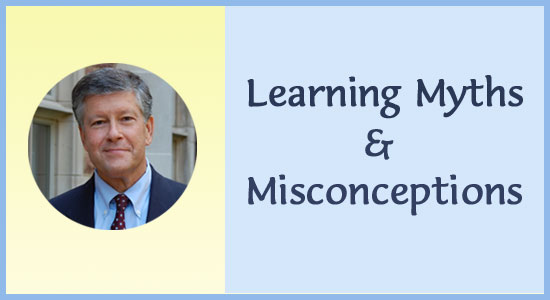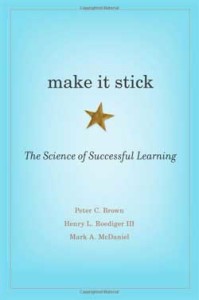Podcast: Play in new window | Download
Subscribe: Spotify | Podchaser | Email | iTunes

In this episode, I speak with Roddy Roediger, PhD, coauthor of Make It Stick: The Science of Successful Learning. We discuss learning myths and misconceptions.
Dr. Roediger is a psychology researcher, distinguished professor and Dean of Academic Planning at Washington University in St. Louis. He is has edited or co-edited ten other books.
 His research has centered on human learning and memory and he has published about 300 articles and chapters, mostly on various aspects of cognitive processes involved in remembering. His recent research has focused on illusions of memory (how we sometimes remember events differently from the way they actually occurred); effects of testing memory (how retrieving events from memory can change their representation, often making them more likely to be retrieved in the future).
His research has centered on human learning and memory and he has published about 300 articles and chapters, mostly on various aspects of cognitive processes involved in remembering. His recent research has focused on illusions of memory (how we sometimes remember events differently from the way they actually occurred); effects of testing memory (how retrieving events from memory can change their representation, often making them more likely to be retrieved in the future).
WE DISCUSS:
- How cognitive psychology defines learning
- Common misconceptions about learning
- How re-reading and review doesn’t work for retention
- Why retrieval practice works
- How higher order thinking skills integrate with retrieval practice
- Retrieval practice and learning transfer
- Simulations
- Study groups
- Interleaved and spaced practice versus massed practice
- Memory consolidation
- Benefits of making learning difficult
- Neuroplasticity
TIME: 35 minutes
RATE: Rate this podcast in iTunes
TRANSCRIPT: Download the ELC 032 Transcript .
RESOURCES:
- Roddy Roediger’s Washington University page
- Retrieval Practice Website
- Make It Stick on Amazon
- Make It Stick Website
- SuperMemo
- Knowledge Factor
Get smarter about online learning with articles, tips and resources delivered to your Inbox once a month.

Yes, I know the feeling. I’m guessing that the knowledge wasn’t well integrated into what you already know and have experienced. Try elaborating on the new knowledge, explaining it to someone else, thinking of examples, reflecting and making it your own.
Nice, learned many things, like the importance of retrieval practice.
From my own experience, I find myself not be able to retrieve certain knowledge at the time I could use it for higher order thinking. It feels like I was able to recall information presented by someone, information seems very familiar, even self-evident, but it was not used by myself to make some conclusions on higher order thinking levels 🙂
Do you know the feeling – how come I didn’t come up with that? : )
Thanks, Holly. I get kind of amazed by the guests too! They are really fun to converse with and learn from.
Best,
Connie
So I had to pause this episode more than once because my brain was racing. I always look forward to new episodes because you have the best guests and some seriously great challenges and ideas not just for elearning folks, but also for educators in general. Thank you for putting this together.
Thanks, Jay. I really enjoyed doing this interview. And even if you know much of the content, it’s always interesting getting it from the perspective of someone who has devoted so much time to studying the field. There are all these little insights.
Best,
Connie
I’m very glad I invested 30 minutes in this podcast. Some of it was new, some was a good reminder, all of it relevant to instructional design. Thank you for posting it!